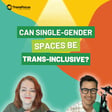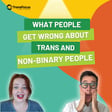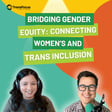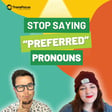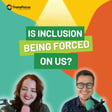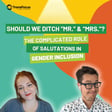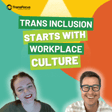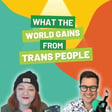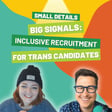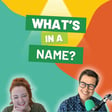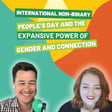Introduction to 'Gender in Focus' Podcast
00:00:04
Speaker
Welcome to the Gender in Focus podcast. I'm El and each week I get to ask Kai Scott, the president of TransFocus Consulting, all the questions you have ever wanted to ask about trans and non-binary people in the workplace and in the wider world.
00:00:18
Speaker
I always talk about like the who to what translation. So rather than men and women, what is it that you're describing about them? What's written is official. And so that's what people are going to lean on.
00:00:31
Speaker
And if it's properly set up, everyone's going to be great. If it's not, they're going to miss the mark.
Impact of Gendered Language in the Workplace
00:00:42
Speaker
Today we're diving into something most people barely notice but affects everyone, gendered language at work. From default references to men, to using he, she, as if that covers all genders, to documents that only acknowledge men and women, these patterns are everywhere.
00:01:00
Speaker
We'll also talk about how terms like female and woman get used interchangeably when they really shouldn't, and how public documentation still clings to the outdated titles, Mr, Ms, Mrs, and so forth.
00:01:12
Speaker
But here's the thing, this isn't just about making language better for trans and non-binary people. Gender inclusive language actually benefits cisgender people too. We'll clear up some common misconceptions, explore the assumptions baked into workplace communications, and offer easy ways to make your language more inclusive without overhauling everything you write or say.
00:01:34
Speaker
I'm joined here by my colleague El will be a part of the journey of unpacking gender-inclusive language. How are you doing, El I'm doing very well, thank you, Kai. How you doing? Excellent, excellent.
00:01:45
Speaker
I'm really excited about this topic. And like I said, it's everywhere. So might as well shine a light. This actually comes up quite a lot in ah in the
Reviewing Documents for Gendered Language
00:01:56
Speaker
workplace. And you you work with organizations quite a lot over this, right?
00:02:00
Speaker
Where do you think that gendered language most frequently appears? Yes, so we review all kinds of different documents, whether it's websites or internal documents, even externally facing documents, contracts, not from a legal lens, but just how language is represented in it, ah you know brochures and PowerPoints and reports and you name it, we've looked at it, ah policies.
00:02:28
Speaker
ah Policies is a really common place that people tend to start because this is something that is aspirational. So if it's inclusive of everyone kind of missing the point of a policy, so it makes sense why organizations want to start there.
00:02:45
Speaker
And basically just taking a very close look at it from a gendered lens. So it's not just gender diversity, but just gender in general.
00:02:56
Speaker
So where are there references to gender in that document? And sometimes they might be invisible to some people because they're reading it from another lens, right? Does this make sense for ah you know whatever thing you're trying to implement?
00:03:12
Speaker
So it's understandable why people miss it. um But because we have such a laser focus on gender, we're able to see things that perhaps others have overlooked. what What would you say like is the most common use of gendered language? things like but Especially policies, if you say that that's where most people begin. where where do you What do you see in those?
00:03:32
Speaker
Yeah, so there's a whole host of different things. The biggest one that comes up quite frequently, and we have these kind of master inventories that we
Exclusion of Non-Binary Individuals in Language
00:03:42
Speaker
take. And for each document, we have a line item, and then we specify what the issues that we see. And so we've done some math on it. It's not just you know a vibe check. It's more based in something.
00:03:57
Speaker
ah Although I'm sure people could also, based on vibes, figure it out. From a data perspective, we have seen the most common one that kind of is on repeat is the use of he and she.
00:04:10
Speaker
When you're kind of trying to reference a general audience um or a topic, you know, he, she, maybe you're describing a role that will do something. And so the chief medical officer, ah he, she will be responsible for x y and Z in her, his domain, right? Or whatever, because people are reading it from one perspective, they can literally not see that.
00:04:38
Speaker
um Or some people don't know what the issue is with that. And I'll explain briefly is that he and she doesn't represent all genders, right? So it does unintentionally exclude people who are non-binary um because they don't use he or she.
00:04:56
Speaker
So that's where... It doesn't quite encompass everyone. The intention is for that to be the case, but it's not. I would also add that it's a bit cumbersome too. Like it doesn't roll off the tongue to say he, she, you know?
00:05:08
Speaker
um yeah So, or even to read it it's like he, she, you kind of feel like it's a bump in the road. I do think it's important to kind of be like, this is how we want to do things, you know? And certainly this one is a really good example where it's super easy to pretty much find them and then replace them. So ah this is ah is a ah good one because, you know, we want to represent everyone in the types of things that we say um because you don't want a chief medical officer who uses they them pronouns to come along and be like, um what's going on
Benefits of Using 'They' Pronoun
00:05:45
Speaker
Of course, they would understand what's happening and know that it applies to them. ah But still, you don't wanna have just delays in people um or to be able to see themselves in what's written.
00:06:00
Speaker
So that's where he, she references are kind of littered throughout and can be easily replaced with the singular use of they, them as a like stand in for anyone.
00:06:14
Speaker
And in fact, there's some research that suggests that using um ah they instead of he or she pronouns and or she pronouns, that it actually reduces the amount of bias.
00:06:27
Speaker
People have images. When we think about he pronouns, we have an image in our mind. Or if we think about a she pronoun, we have an image. And when they is used, actually people don't conjure up an image or it's maybe a bit more of an open image of somebody.
00:06:44
Speaker
And then anybody can step into that and we're not surprised, right? Because sometimes people show up and we didn't expect them to. you know, and we can wear that surprise on our face even um versus if it's a expansive they, it can really be helpful so that we're not skipping a beat when we're meeting somebody for the first time.
00:07:07
Speaker
I will say the evolution of he, she, it comes from somewhere in that it used to be just the default he to represent everybody. Back in the day, even sometimes some documents, I still find he as a default for everybody. i'm like, whoa, we're going back to the vault here. Yeah.
00:07:29
Speaker
um and so especially male dominated um industries can have that it can be pretty prevalent uh so just as simple you know that's why it was he and then people were like okay we can't have that there's women too like yes let's add women into the mix and add she but unfortunately we haven't quite gone far enough to to be inclusive of everyone so where you've got he and she there's also i remember you telling me about using men and women in written things or there's other stuff that you've talked about where it's like gendered and it's kind of the same thing but there are so many easy fixes to it the the change from he she to they is is a pretty simple one and then there's men and women but you could just say
00:08:20
Speaker
Or, or everybody. People. People. Yeah. What do you think is causing people this confusion or this kind of, I don't know if it's, ret is it reluctance or to change or or confusion or what is it?
00:08:32
Speaker
Yeah, absolutely. I think there are folks that probably haven't given it a lot of thought. A lot of it is just not being aware of why this is not exactly, for many people, it's like, this covers everybody. What are you talking about? you know It's like men and women, that's it.
00:08:52
Speaker
you know And in a world where people have largely just thought of there being only two genders, ah And maybe they've been introduced to non-binary people, but maybe they forget,
Misconceptions About Gender Inclusivity
00:09:06
Speaker
right? Because it's such an ingrained thing of like, there's only two genders.
00:09:10
Speaker
It takes some time for people to realize, oh yeah, actually men and women, that's not all the genders, right? We're missing some people. ah So if we think that that term will capture everyone, um there some people read that and not read themselves into that statement.
00:09:27
Speaker
or And so it's just like super simple, right? Where, you know, shifts in language can be truly inclusive of everyone. um Even if the intention was that weren't men and women be that, and just realizing it's not and, you know, we can ah do better.
00:09:46
Speaker
And it's not even that big of a change, right? I mean, it depends on the context of what's written. You know, sometimes you could talk about people. I always talk about like the who to what translation. So rather than men and women, what is it that you're describing about them, right?
00:10:01
Speaker
Mm-hmm. people who have colon cancer, you know, like, I don't know what the the context of the written communications are, ah but that can be read into it. And then, or just simply people, like maybe it was just wanting to talk about folks um or employees or customers, right? Just there's terms that are truly all encompassing of everyone.
00:10:25
Speaker
And sometimes you just don't need to have gender in the mix. And so, You know, just dialing some of that down, doesn't mean they have to remove it entirely. You know, there are moments where it makes sense to reference and definitely if it makes sense, continue to do so in an expansive way.
00:10:44
Speaker
ah But, you know, sometimes not. And that's where those shifts can really help. so that people aren't running over a speed bump. Because it's just like, it's not that it's like, it it does for many hurt, right? It's like, again, I'm not here in the mix.
00:11:02
Speaker
um But for many, it's just like a speed bump. And if you have lots of speed bumps over the day, it just, ah like it adds up, right? And so it was like one time i was ah at the airport in Toronto and I had a i had a delay for three hours.
00:11:21
Speaker
So I gave myself a little project because I'm a nerd that way. And I counted the number of ladies and gentlemen ah for the announcements. It's another very common example.
00:11:32
Speaker
Now that's um not usually in writing. It's more spoken, but has some parallels here with man-woman references. And think I counted 300. Like it was a lot of references to- Oh goodness. Yeah.
00:11:46
Speaker
Yeah, ladies and gentlemen, the flight, blah, blah, blah. You know, every time those like there was an announcement, it was ladies and gentlemen. Yeah. So I was like, so interesting I was like, that sucks.
00:11:57
Speaker
You know, And you know i I wrote to the airport and said, hey, you might think about another version or you know there's so many different ways of of approaching that.
00:12:11
Speaker
Like you can still continue with ladies and gentlemen, but I've been adding um a gentle them to the end. and oh go so Or just hello, esteemed guests or you know flyers.
00:12:23
Speaker
you know There's friendly ways to do travelers, exactly. Yeah. i'm Did they get back to you? they I don't think so. Not that I recall. I mean, I send out so many things.
00:12:35
Speaker
i'm I'm a very much a see something, say something person. What a nerd. Right. I don't keep track of of who responds and sometimes, you know, they take their own pathway.
00:12:47
Speaker
I want to go back to something you said a second ago or a bit ago, which was about how using he and she creates these sort of biases and I want to go back to that because it's really interesting what assumptions are then are made in when you have written documentation and there are gender there's like a lot of gendered language in there that would tell me then that there are a lot of assumptions going on um could you can you speak a bit more about that it's such a clumsy question but I'm really interested in that
00:13:20
Speaker
Oh yeah, no, and I'm glad you're
Influence of Language on Perception
00:13:22
Speaker
circling back because there's so much more to that research. um One aspect before I go into what it, how, like what the mechanics of it is that when you use he, she, people reading it, if they're, they have a binary gender,
00:13:40
Speaker
they will see themselves, right? So if they use she pronouns, they'll see a woman. And if they use he pronouns, they'll see a man, and like a stereotypical man, right?
00:13:51
Speaker
And so then if you think about how you approach people, um maybe it's a job description, right? And, you know, he has he, she littered throughout. And people then ah as part of hiring will kind of imagine that person coming in and as themselves. So if it's he, she language, obviously if it's default, he, everybody sees he like a traditional man.
00:14:19
Speaker
And so that really influences how, you know, your mental landscape is set up to meet somebody that you've not met before, you know, and baking in all kinds of assumptions into that gendered expectations of roles, like how they'll, maybe they will be the same gender.
00:14:39
Speaker
um But then you expect that person to act in a particular way. um You know, if it's a woman, you know, more nurturing and calm and, compliant or you know whatever the the stereotypes are.
00:14:54
Speaker
um And if they're not, then there's a problem. And then we can get into the the kind of ah pathways of like, oh, maybe they're not a good fit, Right.
00:15:06
Speaker
When, if we have a more expansive, like not a pre-prescribed view of who that person is going to be, that allows people to show up as they truly are and understand their skill sets and, you know, be a little bit more oriented towards what actually matters.
00:15:24
Speaker
Can you do the job, right? ah So that's kind of the mechanics of what it does is like, yeah are you imagining yourself? And then if that person isn't like you, you're kind of annoyed or upset or,
00:15:35
Speaker
you know, distraught so or can this person just show up um no matter who they are? That's so interesting.
00:15:46
Speaker
Yeah. I'm so interested in that Well, it it goes even deeper. i don't know how far down the rabbit hole you want to go here. Oh, please. There's another study looking at different types of languages.
00:15:59
Speaker
And the the experiment is somebody who speaks a particular, you know, their their original language, they'll meet somebody and then they'll ask that person describe the person afterwards, right?
00:16:09
Speaker
And if it's a very gendered language, top five will always involve this was a man, this was a woman, something about their gender, assumed gender. Mm-hmm. If it's a less gendered language, um Persian, um you know, Mandarin, I think there's there's a few kind of gender neutral or less gendered languages.
00:16:32
Speaker
Then what somebody's gender is, 20th. Like it's way down the line. They'll describe all kinds of other things, you know, their hair, their clothing, you know, what they were saying or you know personality, personality.
00:16:47
Speaker
Gender is 20th. So how much we you know have gender built into our language or referencing continuously reinforces how we see people and what we categorize them.
00:17:01
Speaker
And yeah, and it's just not as present for folks in more gender neutral languages. That's so interesting. Ooh, thanks for telling me. Oh, yeah.
00:17:14
Speaker
So we think that we're the kind of um purveyors of our perception, but actually language is a huge part of shaping it. So what we say or what we write ah makes a huge difference for what kind of community, culture, space we're trying to create.
00:17:33
Speaker
And that's why I mean, we already know that words have a lot of power, but in this vein, they do as well. That's so interesting. in In some of the work that um I've seen you do, we'll find that some documents will have a kind of mix of both sex and gender, almost as if they
Specificity in Gender Terms
00:17:52
Speaker
mean the same thing. So we'll see sometimes a reference to female and then ah later down the line, it will be a reference to a woman. And do you see that a lot in in the work that you do?
00:18:03
Speaker
Oh yeah, ah big time. And this is, ah I think for most people, they don't notice it because for many cisgender readers, they are interchangeable, right?
00:18:16
Speaker
People can use female and woman. It all applies to certain people. Cool. However, for transgender people, there is a difference between gender identity.
00:18:27
Speaker
Usually the terms man and woman, non-binary, those are gender. specific terms and their sex, which are female, male, intersex. Those are sex-based terms.
00:18:38
Speaker
And so ah it is it's usually something people can kind of navigate. They're like, okay, I kind of see that's mostly probably from a cisgender perspective that it's written and it applies to me or it doesn't. you know People have to...
00:18:52
Speaker
But think it does get confusing, especially in say medical communications or anything where there's like a specific aspect of man or woman that they're trying to get at and maybe is not quite apparent because it hasn't been spelled out.
00:19:06
Speaker
And so toggling between them is like, okay, which one is it and what's going on? And that can actually present a barrier to understanding or access or taking next steps. So it is helpful um to be more specific ah rather than just man or woman or both or a female woman using that interchangeable.
00:19:28
Speaker
It's actually specifying, you know, we're talking about women and people who get pregnant and x y Z, right? Whatever the messaging. Now, not every workplace is handling this specifically, unless, for example, it's related to benefits, especially leave.
00:19:44
Speaker
That's a whole other kettle of fish, so we won't go into that um in a lot of detail because it's not just about changing the language. It's also about aligning systems and all that. um But that's where it can get a bit tricky and confusing for a lot of trans and non-binary folks.
00:20:01
Speaker
um I appreciate why some people are using it from a grammar perspective. Female is an adjective, so it's describing something and is much more easy to use in language versus a woman is a noun.
00:20:17
Speaker
And so it just doesn't work exactly, ah like flows, doesn't flow as much. And so That's why female is used a lot. I will also mention that from a practical standpoint, female covers all ages too. So there's that dimension to it. So it includes girls and women or young women, right? So it doesn't quite give the spectrum if you're just, or you're having to reference girls and women if that's applicable, right?
00:20:48
Speaker
ah Depending on the spread of the ages. So I understand why there is a certain momentum towards using female in some respects, but it's it again, that confusion can arise and can present problems for trans and non-binary folks. So it is a matter of being a bit more creative or more specific.
00:21:10
Speaker
with With all of this, we've been looking at it from the perspective of how this benefits trans people and and how we can make sure that trans and non-binary people are included. But but There are benefits to cis people too, you you alluded to at the beginning. So could you go into that? Because I think maybe people wouldn't have even recognized that or realized.
00:21:28
Speaker
Right, yeah, it's true. ah Oftentimes you're you're right that, you know, as our company name suggests, we are focused on trans people, but certainly not exclusive.
00:21:40
Speaker
ah We do want things to be good for for cisgender people, especially for changing something. It's got to work for them as well, obviously. It's got to work for everybody. um However, what we find is that when we shift language, it actually helps, especially if in this instance, we were just talking about female, woman, and lack of specificity.
Benefits of Gender-Inclusive Language for All
00:22:03
Speaker
Once you start introducing that specificity, that also helps people understand if it applies to them, even as cisgender people. you know, in the pregnancy example, might not apply to them, right? If you think about two women together, ah even whether they're lesbian or bisexual or whatnot, pansexual, they ah one will be the birth parent and one will be, you know, the non-birth parent. And so that specificity is actually helpful, even if both are cisgender.
00:22:30
Speaker
So that, i think, just extra a little bit of legwork can help everybody understand whether something applies to them or not um And so that helps cisgender people.
00:22:43
Speaker
Also, I think there's something to be said about just in that not every instance, we need to reference gender so we can take a little holiday from so much gender.
00:22:55
Speaker
ah And I think there's a bit of relief for cisgender people because of course, think to some degree or another, we all have that pressure of gender on us and whether we're cis or we're trans or or otherwise.
00:23:10
Speaker
And so can we just take some of the gender out of it, especially if it doesn't apply? Obviously stay if it needs to, but for the stuff which is not necessary, just let's have a holiday.
00:23:22
Speaker
Let's, you know, be people, be travelers, you know? like um And I think that is helpful, like just not as much ah cognitive load for folks um and who are also cisgender.
00:23:36
Speaker
And some of it we talked about in the research too, right? Just that openness to people, being able to receive people who you meet for the first time for who they are rather than having already applied something on them that then you have to like remove and reapply something else if it doesn't fit.
00:23:55
Speaker
Especially what you yeah what you were saying about hiring. or that's That's really wild that that can have such a massive impact. Makes sense. I mean, we don't we like subconsciously take in that messaging all the time, but it's just really interesting and that can definitely benefit, ah especially in like male dominated or places that really have that heavy heavy gendered expectation. That's really interesting. And I think that it could really benefit um everybody. And also what you just said about things like, did you say birthing parents?
00:24:23
Speaker
ah People who are pregnant. People who are pregnant, right. I have, one of my best friends has a wife who gave birth. And i think what often happens is when you don't have that guidance, you don't have that um practice around non-gendered languages that you can start filling in your own gaps. And so what happened with them was that you had, um who's the the real mum?
00:24:47
Speaker
and Oh, geez, people. yeah think Yeah, which really sucks. And luckily for them, that they were, you know, ah they took on the chin and and they they handled it as well as they could. But this guidance or having that kind of in practice and explicitly laid out, it really benefits everybody. So you don't fall into...
00:25:13
Speaker
that ah situation where they are both cis. Totally. And especially having write written down helps to give people the language to describe that and to talk to people.
00:25:26
Speaker
and it sets the standard too to say in our organization, this is how we talk about it, right? And you know it sets staff up for success because most staff, they want to do the right thing.
00:25:39
Speaker
And they're like, just tell me what to say. i'm on it. Let's go. But if if you have everywhere mother only, then that's what they're going to replicate um because that's what's written. What's written is official.
00:25:51
Speaker
And so that's what people are going to lean on. And if it's properly set up, everyone's going to be great. If it's not, they're going to miss the mark. For sure. Yeah. What would you say are some like common misunderstandings regarding inclusive writing and communications?
00:26:06
Speaker
ah Common misconceptions is going to take a long time. ah It's going to be controversial. um It's not necessary. There's a common misconception is there's too few trans people to make so much of an effort.
00:26:20
Speaker
hey So those almost bit tied together, right? It's going to take a lot of effort and there's too few to even warrant this type of change. Of course, it doesn't just apply to inclusive writing, but it come it it's pretty present for that.
00:26:34
Speaker
When, in fact, a lot of the changes, if you make them and didn't talk about them, people would probably not notice them, right? Right. and um and they can be done fairly quickly. Now, certain ones, you want to be a bit more careful. Like I mentioned, the benefits, you it's not just about um changing the words. like You have to think about the systems that support that and make sure they're up to date, there's third parties, et cetera, et cetera. So I do advocate for thoughtful process, but
00:27:06
Speaker
it's actually not as cumbersome as one thinks. It really is helpful to to take an inventory to know where you're at what the problem areas are, how prevalent the problems are too because sometimes uh people think oh it's just here and there and then we like give them you know this happens more than 26 times 36 of your documents people are like oh okay this is a thing right like um it's deeply woven into how we talk um
00:27:38
Speaker
And then to undertake, um ah you know, a change process, you know, basically track changes in a Word document. and But, you know, there's this thoughtful process that can be undertaken that doesn't need to take a long time um and is not generally super controversial because it's really about expanding the circle rather than changing things or excluding people or anything like that. So, yeah.
00:28:09
Speaker
I think it's okay and important to discuss it, especially with internal stakeholders, so that they understand what's happening. People generally just need to know why. um and because some people just miss that there's, you know, non-binary folks who are excluded or you know, by describing men and women in a very narrow way, it excludes trans men and women.
00:28:32
Speaker
And so just a bit of help on that front can really set people up for success. And It doesn't really cost, but I mean, some time, but not material cost, right?
00:28:43
Speaker
I mean, certainly if there's like banners or, you know, things where you've printed ah things that might need to be updated, ah but you can take a gradual approach, right? To say, let's change the easy stuff first and then build a bridge to changing things that cost money.
00:29:00
Speaker
if they do at all. So um those are some of the common misconceptions and ah the kind of the the more realistic look at things. I should have asked this earlier, but I forgot. And so ah there is no easy move into it. um But I was thinking about how you do a lot of public speaking. And that's kind of a ah big part of a big element of your job. And you've mentioned before about documentation and how speakers are listed and sort of
Inclusive Language in Public Speaking
00:29:33
Speaker
presented. Could you talk about that as well? oh Sorry that there's no ah swift move into that. Oh, no worries. I mean, this is a really interesting one that especially happens in a lot of municipalities ah or government in general where there's public hearings and people are documented as having spoken on a particular topic. you know, for or against or, you know, whatever they're bringing. And this is a really important part of democracy that not only people come and speak their their voice or their experience to a particular issue, but that it's recorded and documented by the government and then they action, hopefully, that that input, right? So this kind of consultative process is key.
00:30:19
Speaker
However, ah There are some ah ways of of recording that can be inclusive or ones that are ah less than ideal, especially for trans folks. And we want to encourage trans people to be a part of ah public discourse. um So by making these adjustments, especially i would say municipalities where there's a lot of discussion and a lot of participation,
00:30:42
Speaker
probably less so provincially or even federally. um But still, important to think about how that's recorded. An example of that is often recorders who are part of a public meeting will look at somebody and be like, okay, it's um based on somebody's appearance, masculine, feminine, or otherwise.
00:31:02
Speaker
they'll be like, okay, that's a Mr. Scott, right? I look masculine, so I'm going to use the title Mr. Scott. And it's it's a way of of a deference, right? A respectfulness, so I get why titles are used.
00:31:17
Speaker
But unfortunately, so many assumptions are made and some of them are correct, but for especially trans and non-binary folks, there are a lot of mistakes. And so people get misgendered in the official record speaking on a topic. It's just not a great thing. It's really awful experience for for many folks and we discourage them from future discussions.
00:31:41
Speaker
So... We don't want to use titles which have gender baked into them. Also, not great for cisgender women. Not a big fan, right? Because now we're going to also make assumptions based on somebody's age if it's Mrs. mrs or Ms. Like, ugh, no, no, no, no. no And there's so many stories, not just of trans and non-binary folks that are that just not have not enjoying this at all.
00:32:07
Speaker
And even if you did collect, like it's best to hear directly from the person what titles they use, making sure there's an expanded list that includes MX, which is a gender neutral title.
00:32:19
Speaker
Even that people mess up because they refer to somebody, right? And again, are using assumptions because they're in the moment, make a quick snap judgment. So ideally you just shift to a gender neutral approach or gender inclusive approach, which is Speaker Scott.
00:32:36
Speaker
you know right This just solves a problem on many different fronts. And we're not having to guess because that's stressful. Like that's not fun to have to guess. um And we we get it right 100% of the time, done, right? So ah that's a really easy solution. And then you don't have to collect it and you know remember it and you just speaker or author if somebody submitted ah comments. So yeah.
00:33:06
Speaker
It's quite a ah sort of risky business to be doing that based on how someone looks as well though in general. Beads of sweat coming down. But there are so many examples of people being like cis people being misgendered all the time if they don't fit what we would expect.
00:33:21
Speaker
So to base somebody's title purely on how they look is. um problematic really for everybody. Nobody wins in that case. Yeah, yeah. what What's even ah further than the Mr, Ms, Mrs is ah goes into roles within the municipality including my favorite, his worship, the mayor.
Critique of Gendered Titles
00:33:45
Speaker
which is ah back to the default man assumption that mayors are going to be primarily or only men. And then are you goingnna have to switch it around to her worship, their worship?
00:33:58
Speaker
Like maybe their worship would be fun, actually. How about we could just say, you know, something, we could still be in deference to that, um you know, we honorable.
00:34:10
Speaker
I think worship is a little far. It's bit much, don't you think? That's a bit royal-esque. Maybe and Honorable you know Scott. Honorable Scott. That has a good ring to it.
00:34:23
Speaker
Do you want us to start calling you that? Oh, my gosh. No. That would plus-plus uncomfortable. but That's funny. Wow. I want to link in the show notes the inclusive communications resource.
00:34:37
Speaker
um Could you explain that before we go? Yeah. Yes, I would be glad to do so. It's a really good resource. We spend a lot of time trying to assemble all the things we've ever heard across so many different you know healthcare, care government, corporate settings where we've heard different examples or seen them in the documents reviewed.
00:34:59
Speaker
They kind of put together a best practices a style guide to help you so you don't have to figure it all out because it's a lot to think about. And basically it goes through all the things but not to do and examples of it and then suggests alternatives to that, either one or more alternatives.
00:35:19
Speaker
ah So you have options. And then also explain why. because oftentimes the why really missing in this and helps to shift and help pivot away from certain things.
00:35:30
Speaker
And again, you don't have to do it all at once. You can just do take take steps to address, especially looking at the more prevalent um ah instances ah And also you know feel free to reach out to us if you want to kind of go through more of ah um a thoughtful process with um an inventory of your documents and we can review them together with you and then talk through some of the solutions and kind of tailor them to you.
00:35:56
Speaker
But if you would just want to run with the resource we have and figure it out yourself, yeah by all means, ah we we really ah welcome people to take this important journey on inclusive writing and
Connecting on Social Media
00:36:09
Speaker
communication. so Where can we find you on social media? kit I realize I haven't asked you that for like ah about six episodes.
00:36:16
Speaker
Oh, nice. I've been spared. no it's all good. ill I'll gladly list the socials. ah Yeah. There's LinkedIn, there's Facebook, there's TikTok, where I will not dance.
00:36:31
Speaker
Yeah. No, no, no. I mean, we'll see. what We'll see. Gender inclusive dance. We'll see. TikTok. What else do we have? Oh, Instagram.
00:36:42
Speaker
Basically, pretty much anywhere. Threads and Blue Sky. So join us on one or more of those and get into these helpful tips. We post weekly ah quite extensively so ah you can continue your inclusion journey.
00:36:59
Speaker
Thank you so much, Kai. And um I guess we'll see you next week. Excellent. Thank you so much. Bye for now.

